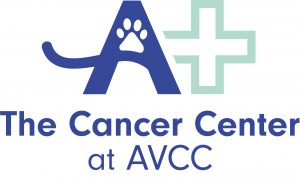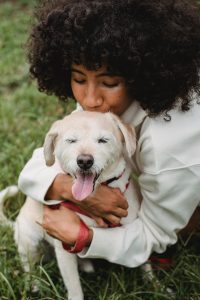13 Most Frequently Asked Questions about Chemotherapy
July 29, 2020

Will chemotherapy make my pet sick?
Chemotherapy is very well tolerated in most dogs and cats. Most patients experience no side effects. Around 15% will have mild side effects that will last for a few days and many will improve on their own. About 5% of patients can experience more moderate side effects and less than 1% can have more severe/fatal side effects. Cats tend to tolerate chemotherapy even better than dogs, and both tend to handle chemotherapy better than people. We have effective medications that can help minimize the most common side effects that may happen and help your pet get through them more quickly.
Can my pet eat before their chemotherapy treatment?
YES. There are two circumstances we would ask you not to feed your pet. First: If your pet is scheduled to receive an abdominal ultrasound please withhold food and water starting at midnight the night before your appointment. Any food in your pet’s stomach or intestines will result in a poor image and an ultrasound cannot be completed. Second: There are a small percentage of our patients that are a little nervous coming for their treatment. So we may have to give them a little sedation to make this a less stressful experience for them. We would ask you not to feed them that day. You are more than welcome to bring food with you for either circumstance. When they are fully awake, we can offer it to them.
Should I make changes to my pet’s lifestyle while receiving chemotherapy?
Drastic life-style changes to your pets “normal” daily routine are not necessary during chemotherapy treatments. At times, certain pets may experience a bit of lethargy/low energy level the day of chemotherapy. This may continue for a few days. Let them be your guide. If they don’t feel like doing something, don’t force them. But, if they feel up to it go right ahead. We have patients that continue to perform well in their agility trials, swim, or keep going on their hikes. If you have any questions regarding holistic supplements, please ask either an Oncology nurse or your Oncologist.
What should I do if my pet has an “accident” in the house?
If your pet has a urinary or stool accident in the house during the first 24-48 hours we ask that you wear either latex or kitchen gloves for clean-up. A small amount of chemotherapy is excreted through your pet’s bowel movements and urine during that time period. Soak up as much of the liquid as you can with absorbent paper towel. Clean the area with an adequate amount of water, allowing it to sit for several minutes. Then use a cleaning product as you would normally.
Place stool from the outside yard in a plastic bag and dispose into your garbage. While cleaning out a litter box, wear gloves during the first 24-48 hours. If using a flushable litter, you may continue to place urine and stool in the toilet for disposal. Otherwise, using a separate garbage bag each time before placing it in the regular trash is advisable.
My pet has been licking the leg that the chemotherapy was administered. What should I do?
Please call the hospital to speak with an Oncology nurse at your earliest convenience for assistance. Next, please discourage your pet from licking the area. The easiest method is to have your pet wear an Elizabethan collar when unsupervised. Licking can cause unwanted lick granulomas or aggravate a potential chemotherapy leakage injury. A nurse will ask you if you notice any signs of redness, irritation or swelling at the site. Any of those signs may be an indication that some of the chemotherapy may have leaked outside the vein. In the best interest of your pet, we will request that you make a quick physical exam appointment for your Oncologist to examine the area.
Do I have to separate my pet from other members of our animal family after their treatment?
NO. The chemotherapy is eliminated mainly through your pet’s urine and stool within the first 24-48 hours of treatment. It is safe for your other pets to drink and eat out of the same bowls. They may also play with the same toys and sleep on the same surfaces.
Will my pet lose its hair during chemotherapy?
Typically, animals receiving chemotherapy do not lose their hair like a human might during the treatment period. The main reason why animals do not lose their coat is because a dog’s hair mostly grows in two phases. On the second phase (referred to as telogen) the hair has reached its maximum growing point and then stops growing. Since the hair is no longer growing (rapidly dividing cells), they are not susceptible to chemotherapy. Some breeds of dog such as Maltese, West Highland Terriers, Schnauzers, Boxers, Poodles and other dogs with hair coats similar to humans have a potential for thinning. Coat fullness or texture may change with chemo.
Can I still vaccinate my pet, apply flea/tick products or give Heartworm preventative?
YES. Yearly administration of vaccinations at your regular veterinarian does not have to stop during your pet’s chemotherapy treatments; however, we recommend to consult with the oncologist prior to proceeding with any vaccines. We do ask that if your pet will be receiving any vaccinations please do it on an “off-week” of chemotherapy and have your veterinarian run a CBC (complete blood count).
The CBC will ensure that your pet has an adequate amount of red blood cells (RBC), white blood cells (WBC) and platelets for his or her body to handle the vaccinations. We also advised to not do multiple vaccines in one visit unless needed. Additionally, heartworm, flea and tick products do not tend to interfere or cause any known side effects during your pet’s cancer treatments. You can always talk to your pet’s oncologist if needed for further guidance.
Can my pet go to a boarding facility and are there any special requirements?
YES. Boarding your pet at your regular veterinarian or at a kennel while you are out of town is safe during your pet’s chemotherapy treatment. If your pet will be receiving at home chemotherapy medications during the time of boarding, please check with staff members to be sure they are comfortable with safely administering chemotherapy pills. If there are any questions, please let them know they can call 954-500-8387 to speak with an Oncology nurse.
There will be children interacting with my pet, what precautions should I take?
During the first 24-48 hours you do have to be cautious with children. The main concern would be if the child somehow came into contact with some of the urine or stool from your pet due to the possibility of a small amount of chemotherapy excretion.
I am currently pregnant or planning on parenthood in the near future. Are there any precautionary measures that I should be taking while my pet is receiving chemotherapy?
YES. During the entire length of pregnancy, a woman should take several precautionary measures to assure that no pregnancy complications arise from their pet’s chemotherapy treatment. Cleaning the litter box or picking up from your dog may seem like a simple daily task. But, it is one area that you may come into contact with residual chemotherapy drug. If at all possible, have your spouse or a significant other clean-up after your pet after their chemotherapy treatments.
If your pet will be receiving at home oral chemotherapy medications, please have another responsible adult pill your pet. There may be some residual chemotherapy on the pills or in the vials which we would not want a pregnant woman to come in contact with. If you have any further questions, please do not hesitate to ask an Oncology nurse or your physician.
What measures should be taken when administering oral chemotherapy at home?
If you are administering chemotherapy at home, there are precautions to be taken. You should wear un-powdered latex gloves (not vinyl) when handling chemotherapy. Do not crush or break the pills. Wash your hands thoroughly after contacting the drugs. Dispose of the gloves immediately into the garbage. Please keep the medicine in the vial in which it was provided to you. The medicine bottles should not be stored in the kitchen, nor near food or cosmetics. They should also be stored away from children and pets. Refrain from smoking, applying makeup, adjusting contact lenses, eating and chewing gum while handling the drugs.
What should I do if my pet starts vomiting or having diarrhea while on chemotherapy?
If your pet starts to experience any vomiting, please withhold food and water for 6 to 12 hours. Then reintroduce small amounts of water first. Then if no vomiting is observed, you can offer small amounts of bland foods such as boiled chicken or hamburger with white rice. You can gradually reintroduce your pet’s normal diet, if there’s still no vomiting observed.
In the case of diarrhea, offer an easily digestible bland diet as mentioned above and gradually reintroduce your pet’s normal diet. If the diet is provided by the hospital, please administer an anti-vomiting or anti-diarrheal medication as indicated by your pet’s oncologist. Please contact the hospital for a prescription. If your pet’s vomiting or diarrhea is severe, is accompanied by an elevated temperature (>103F) or is lethargic/weak and not feeling well, please contact the hospital immediately at 954-500-8387.
For more on the comprehensive guide to pet cancer care, click here.
The Cancer Center at AVCC is located in South Florida in Broward County.
8920 W. State Road 84,
Davie, Florida 33324
954-500-8387
The Cancer Center at AVCC offers the following oncology services:
Diagnostic tests including:
- Fine needle aspirates/cytology
- Bone marrow aspirates
- Bone biopsies
- Incisional and punch biopsies
- Personalized genomic testing
Treatment:
- Traditional chemotherapy (intravenous/intracavitary)
- Metronomic chemotherapy
- Targeted chemotherapy
- Immunotherapy
- Palliative care and pain management
- Hospice counseling
- Nutritional counseling and referral
- Referral for pet radiation therapy
